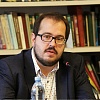Regional Trends in the Middle East: Political and Economic Dynamics
(votes: 5, rating: 5) |
(5 votes) |
Dr. of History, Chief Researcher at the Center for Arab and Islamic Studies of the Institute of Oriental Studies of the RAS
Ph.D. in History, Deputy Director for Science of the Institute of Oriental Studies of the RAS, Head of the Center for Arab and Islamic Studies of the Institute of Oriental Studies of the RAS, RIAC Member
Ph.D. in History, Senior Researcher at the Center for Middle East Studies of the Institute of Oriental Studies of the RAS; Associate Professor at the Department of Economics and Economic Geography of Asian and African countries, Institute of Asian and African Studies, Lomonosov Moscow State University
Ph.D. in History, Researcher at the Center Middle East Studies,Institute of Oriental Studies, RAS
Ph.D. in History, Associate Professor at the Department of Jewish Studies, Institute of Asian and African Studies, Lomonosov Moscow State University; Researcher at the Department for the Study of Israel and Jewish Communities of the RAS
Ph.D. in History, Academic Director of the Russian International Affairs Council, RIAC Member
Program Coordinator at the Russian International Affairs Council










